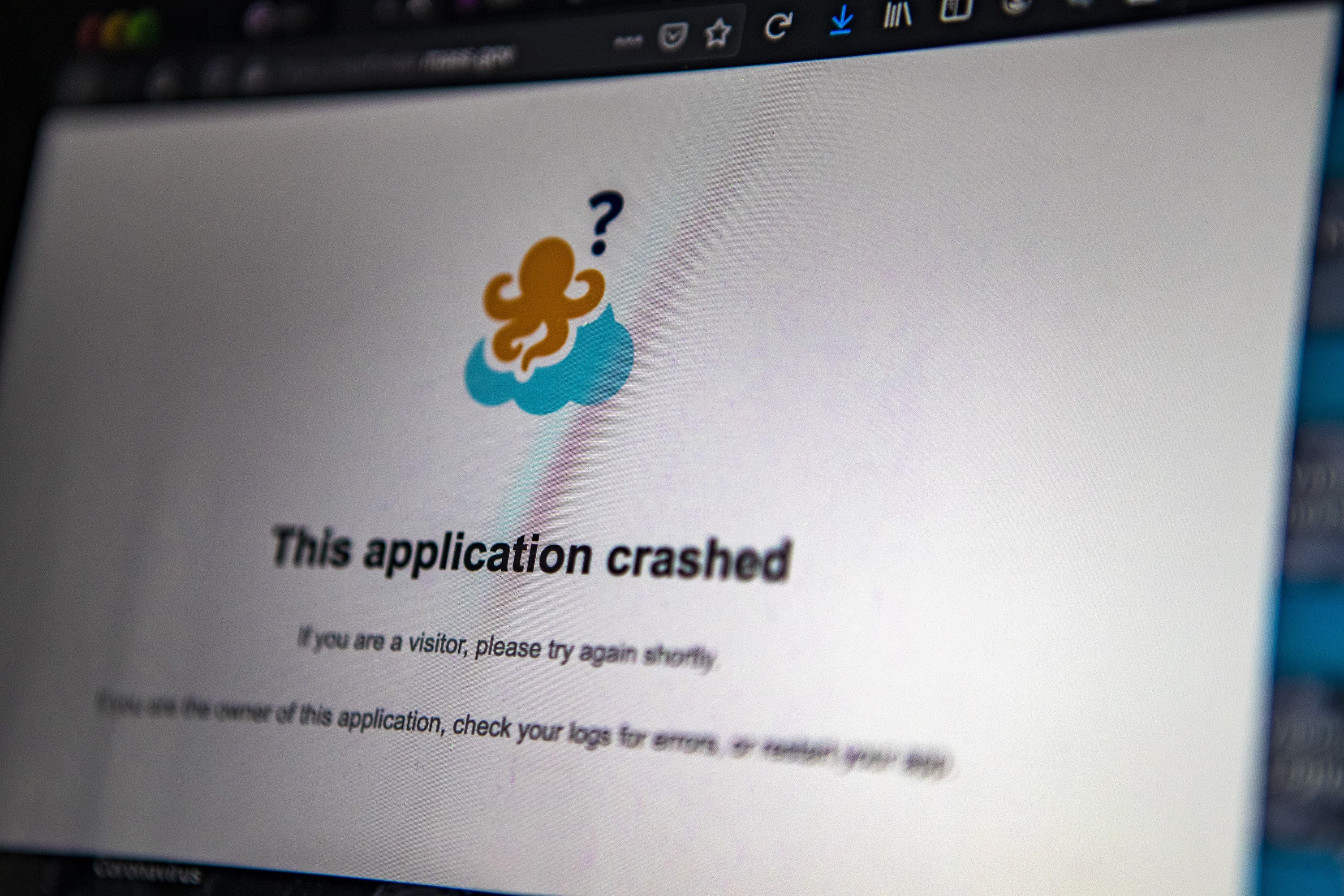Advertisement
Vaccine Coverage
Rage Quit: Mass. Residents Furious Over State's Faulty Vaccine Websites

Traducido en español por El Planeta Media.
For an estimated million Massachusetts residents who had been waiting for their turn to book a COVID-19 vaccine appointment, their time had finally come.
With the promise of openings going live at 8 a.m. Thursday, many of these newly eligible residents threw themselves at the state's vaccine registration sites to try to secure an appointment. For hours. And hours. And hours.
Two critical state websites — one listing clinics, pharmacies and vaccine sites and their availability, and one where residents can find signup pages or register for appointments at mass vaccination sites — splintered under the heavy traffic. All morning, residents trying to reach these websites were greeted with a “bad gateway” error or another error notification. On one website, a four-tentacled cephalopod sadly informed users the web application had failed.
WBUR readers and listeners wrote in to tell us of their experience. Some managed to get appointments, others could not. Many gave up. Some cursed technology, the state and the governor for their woes.
“Now I understand why they call Charlie Baker governor Eeyore Killjoy. How could they not have prepared for this,” Philip Orlando, 65, from Reading, wrote to WBUR. In a second message, he said he had tried — and failed — to book an appointment about 200 times.
"The state’s website crashed repeatedly throughout the day. ... Now the website says 'the clinic does not have any appointment slots available.' ... The total failure of this system is inexcusable. It is a nightmare!"
Elisabeth McLeod, 72, from Taunton
“I started this morning at 7:00 AM and continued into this afternoon. I’ll likely try tonight as well,” wrote Scott Gilmour, 65, from Winchester. “... I would get kicked off the system and see the different error messages again. I was persistent with no luck. Frankly, I’m really pissed off and very disappointed.”
Or, succinctly from Carlos Ramos, 67, “I COULDN’T GET THROUGH IT BEEN VERY DIFFICULT.”
Gov. Charlie Baker acknowledged the struggle residents were facing and said that he, too, was livid over the websites' state of affairs.
"My hair's on fire about the whole thing. I can't even begin to tell you how pissed off I am, and people are working really hard to get it fixed," he told GBH Thursday afternoon. "People did a lot of work preparing for this, but clearly they didn't do enough."
The state's COVID-19 Command Center apologized "for the frustration and inconvenience residents experienced over the course of the day" in a statement posted Thursday night, noting that residents were able to successfully fill all 60,000 available appointments.
Advertisement
The websites were not the only things experiencing technical difficulties. The state’s 2-1-1 hotline meant to help residents sign up also failed to connect callers to vaccine appointments.
“The site crashed. I tried calling the 211 number and it kept hanging up on me. I finally got through after 3 hours of trying, but they were not able to provide me with an appointment,” Rosaura Quirarte-Perez from Marlborough told WBUR.
"... Foolish system. Ill-designed. Who are the people that designed it? ... Why not hire 10 MIT [computer science] students and get it done right?"
Steve Rosenfeld, 70, from Worcester
In many cases, people were able to load a website and begin the process of registering for a vaccine slot. Then, partway through, the site would suddenly shut down or the slot would be taken and they’d need to start the process over.
In other cases, their appointment request simply wasn’t filled and, again, they would have to begin anew. This was also the case for WBUR's own Bob Oakes, who tried for six hours and six minutes to lock down an appointment before he succeeded.
“Initially, the site was down. Eventually, I was able to see a list of available dates. I had to choose one, then choose a time of day,” Sarah Metcalf, 67, from Northampton, wrote. “... I would get a message that sorry, there were no slots available at that time. So, I’d go back to the menu, choose another date/time, and do it all again. Again & again, no slots. ... I was able, at the end of 5 hours, to see how many times I'd tried: 57."
“Site crashed. When I did find available appointments, I had to fill out a lot of personal information, then the appointment disappeared. Since the info is not saved, it has to be reentered every time. Foolish system. Ill-designed. ... Who are the people that designed it? Why not hire 10 MIT [computer science] students and get it done right?” Steve Rosenfeld, 70, from Worcester, wondered.
Indeed, many residents questioned how this state, of all the states in the nation, could land so hard on its face when Massachusetts has such a concentration of science, technology and medical talent. Surely, they said, some students at the venerable Massachusetts Institute of Technology wouldn’t mind making this part of their undergraduate or master’s thesis. Or what of the throngs of tech companies here that make creating seamless web applications their daily business?
"The site crashed. I tried calling the 211 number, and it kept hanging up on me. I finally got through after 3 hours of trying, but they were not able to provide me with an appointment."
Rosaura Quirarte-Perez from Marlborough
Massachusetts company Everbridge helped West Virginia get set up with their vaccine administration process. West Virginia is now one of the leading states in the country in terms of vaccination. Boston-based Quickbase also helped Tarrant County, Texas, set up its vaccine registration website.
One of Quickbase’s executives, Jay Jamison, says Tarrant County was able to process 500,000 requests in over a month and as many as 40,000 a day on its platform — partially because they were using cutting-edge web application technology. That’s not always the case for government systems, Jamison says.
“Legacy technology can be very, very hard to adapt to the needs and demands of right now, and that to me is the root of the problem,” Jamison says.
One such technology that the state could use is a cloud computing service that scales up server power to meet demand. Olivia Adams, a software developer who created MACovidVaccines.com while on maternity leave, uses one such service from Amazon. That’s why her website didn’t crash when the state’s did, she thinks.
“It’s frustrating that our site is resilient enough to handle the traffic, but official websites aren’t,” she says.
This problem was entirely foreseeable and preventable, Adams says. She just hopes that it’ll be solved for the next wave of younger, and even more Internet-capable vaccine seekers.
This article was originally published on February 18, 2021.
